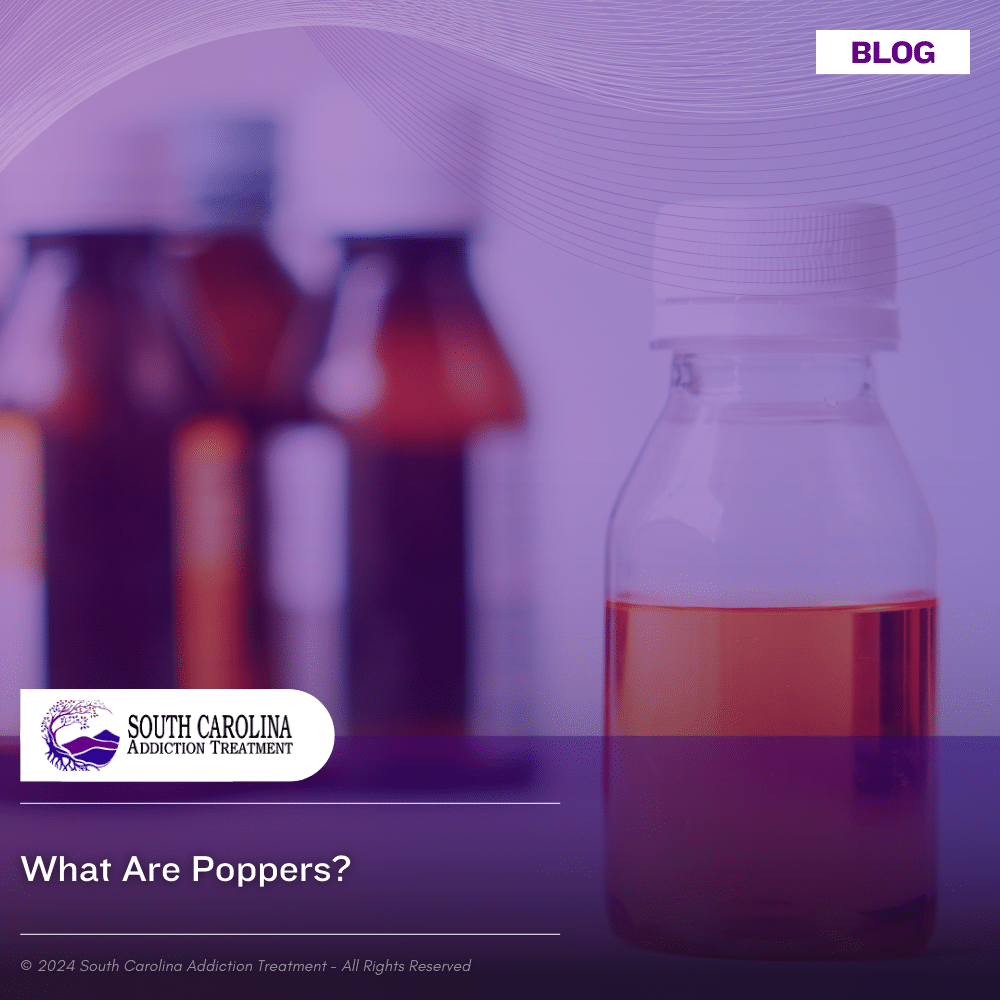What are Poppers?

Medically Verified: 2/1/24
Medical Reviewer
Chief Editor

All of the information on this page has been reviewed and verified by a certified addiction professional.
Poppers are a type of inhalant drug that is found in gas stations and adult stores. These substances are often marketed as air fresheners or deodorizers, however, people buy them to inhale them and experience a high. These substances have a wide variety of nicknames, including Rush, jungle juice, locker room, and iron horse.
The FDA warns that poppers “can be caustic and damage the skin or other tissues they come in contact with, cause difficulty breathing, extreme drops in blood pressure, decreases in blood oxygen levels, seizures, heart arrhythmia, coma, and death.”[1]
While poppers are often abused by people in the club or rave scene, they are not safe and should never be consumed by humans.
How Do People Use Poppers?
“Poppers” is the slang term for an inhalant that contains amyl nitrite and butyl nitrite. While amyl nitrite is a medicinal substance used to treat chest pain, the version that is sold over the counter is not safe for human consumption. Unfortunately, people continue to abuse them because they can enhance sexual experiences and produce a short-lived high.
Some of the nicknames for various types of poppers include:
- Rush
- Super rush
- Iron horse
- Jungle juice
- Locker room
- Sub-zero
When someone abuses poppers, they inhale the fumes, causing the chemicals to quickly enter their bloodstream and have almost instantaneous effects.
What is in Poppers?
Each popper might contain a different type of alkyl nitrite. Unfortunately, almost every alkyl nitrite has the potential to be extremely dangerous and even deadly.
The main chemicals found in poppers include:[2]
- Amyl nitrate – is often associated with memory loss, delirium, hallucinations, and death in large doses.
- Amyl nitrite – can lead to asphyxiation when used short term. Long-term effects may include heart and blood vessel issues.
- Butyl nitrite – long-term risks include damage to the heart, brain, blood vessels, muscles, liver, and kidneys
- Isobutyl nitrite – may cause increased heart rate, blood vessel expansion, and feelings of excitement
- Isopropyl nitrite – known to cause visual disturbances, blurry vision, and retinal damage
What are the Effects of Poppers?
While people mainly use poppers for a pleasurable feeling of euphoria, some people find the effects disorienting and unpleasant. These substances work as vasodilators, meaning they expand your blood vessels.
Common effects of poppers include:
- Decrease in blood pressure
- Dizziness and lightheadedness
- Increased heart rate
- Warm sensations throughout the body
- Relaxation of certain muscles
Poppers can relax the muscles and produce euphoria, so people might use them to enhance sexual experiences. However, abusing poppers can lead to dangerous side effects, including fainting and unconsciousness.
Are Poppers Dangerous?
Poppers can be incredibly dangerous, especially because of the way they affect blood pressure. When your blood pressure drops too low, you can experience confusion, lightheadedness, dizziness, and even fainting.
Other dangers associated with abusing poppers include:
- Injury to red blood cells and reduced oxygen supply to vital organs leading to death
- Losing consciousness and choking on your own vomit
- Poppers increase your likelihood of risky sexual behavior and diseases
- Crusty skin lesions from exposure to amyl nitrite fumes
- Allergic reactions to fragrant chemicals
- Respiratory reactions from inhaling the substance like wheezing and sinus issues
- Headaches from widened blood vessels in the brain
- Burnt skin from contact with amyl nitrite
- Increased pressure in the eyes
According to the FDA, “Healthcare providers are reporting increases in deaths and hospitalizations related to intentional ingestion or inhalation of nitrite products for recreational use, including sexual experience enhancement.”[1]
Additionally, the National Institute of Drug Abuse reports that any type of inhalant abuse can lead to sudden sniffing death, a syndrome that causes even healthy individuals to die from using an inhalant just one time.[3]
Other ways that inhaling poppers can lead to sudden death include:[3]
- Asphyxiation
- Suffocation
- Convulsions or seizures
- Coma
- Choking
- Fatal injuries like motor vehicle accidents while intoxicated
Abusing inhalant drugs like poppers is incredibly dangerous. Approximately 100-200 people die as a result of inhalant drugs each year.[3]
Finding Help for Amyl Nitrite Abuse and Addiction
If you or a loved one frequently abuses poppers or amyl nitrite, you might be suffering from an inhalant use disorder. Inhalant addiction is incredibly dangerous as it can lead to damage to a variety of organs and sudden death. As a result, you should always seek help from a professional drug rehab program.
To learn more about our drug and alcohol rehab programs, contact South Carolina Addiction Treatment today.
References:
- The Food and Drug Administration (FDA): Ingesting or Inhaling Nitrite “Poppers” Can Cause Severe Injury or Death, Retrieved June 2023 From https://www.fda.gov/consumers/consumer-updates/ingesting-or-inhaling-nitrite-poppers-can-cause-severe-injury-or-death
- Australian Government- Therapeutic Goods Administration: Testing of Alkyl Nitrite ‘Poppers’, Retrieved June 2023 From https://www.tga.gov.au/resources/publication/tga-laboratory-testing-reports/testing-alkyl-nitrite-poppers
- The National Institute of Drug Abuse (NIDA): Inhalants Research Report, Retrieved June 2023 From https://nida.nih.gov/download/1820/inhalants-research-report.pdf?v=5eca964ea01b25ded294000aca93f747ants

